Submitted by taoyue on Fri, 12/16/2005 - 03:00
Why England Slept
by John F. Kennedy
New York: Funk, July 1940
It is difficult to read Why England Slept without seeing the shadow of the future president hanging over every word. Most prophetic indeed is Henry Luce's foreword, which notes on p. xiv:
In recent months there has been a certain amount of alarm concerning the “attitude” of the younger generation. If John Kennedy is characteristic of the younger generation—and I believe he is—many of us would be happy to have the destinies of this Republic handed over to his generation at once.
[...]
Submitted by taoyue on Mon, 12/05/2005 - 15:00
Le Déclin de l'Empire Américain
(The Decline of the American Empire) (1986)
directed by Denys Arcand
Frames in this review are taken from the Koch Lorber DVD, released in
2004.
The Decline of the American Empire is a satirical title, because
the film is actually about sex. Look at the movie poster: three people
holding up placards with the letters “S E X!” marked in pink. Except
that the characters in Decline are academics at a Canadian
university, so what they actually do is sit around and
talk about their sexual escapades. Indeed,
this is a very stagy film, one that has barely been opened up for film
with only moderate use of location and camera moves. And these are more
eye candy than a visual language -- as when the camera focus-pulls back
and forth as a character exercises on a weight machine. A stage version
could make do with only three sets: a kitchen, a gym, and a living room.
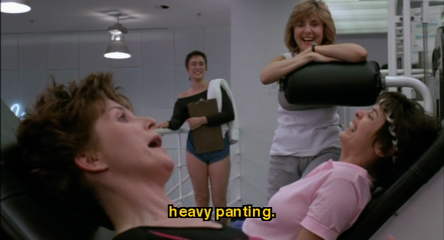
The film recounts one day among a group of academics in Québec. Rémy
(Rémy Girard) is hosting a dinner party for his friends, and is spending
the afternoon cooking with the help of three male buddies. His wife is
off at the college gym, working out and swapping girl talk with the three
other female invitees. As the dinner takes shape, both the men and the
women talk frankly about sex — about lovers, partner-swapping, dangerous
hitch-ups, drug-enhanced orgasms, and more.
The ensemble characters are defined principally in terms of their sexual
relationships. Diane (Louise Portal) reveals red whip marks on her back
in the locker room, and explains that she's been pursuing a masochistic
relationship with a guy she met at a bar, the rough biker type Mario
(Gabriel Arcand). Diane previously could never stand to be dominated by
a man, but now she loves getting her hair pulled "like a horse's mane"
while crouching doggy-style. [...]
Submitted by taoyue on Sun, 11/06/2005 - 15:00
Les Demoiselles de Rochefort (1957)
aka. The Young Girls of Rochefort
Directed by Jacques Demy and Agnès Varda
Frames in this review are taken from the Miramax DVD, released in 2003.
Could life ever be as fanciful and carefree as it is in Les Demoiselles de Rochefort? In this third film of Jacques Demy's romantic trilogy, which he codirected with his wife and longtime collaborator Agnès Varda, France is basking in a ray of pastel colors and joyous song. The troubles of Algeria are behind her, the student protests of 1968 have yet to arrive, and summertime love is in the air. Soldiers have nothing to do but go on practice maneuvers, money is unimportant, and lost loves … well, let's not spoil the ending.
[...]
Submitted by taoyue on Sat, 10/29/2005 - 16:00
Becket (1964)
directed by Peter Glenville
Frames in this review are taken from the MPI DVD.
Some Kings and Queens of England just make for better subjects of drama
than others. George IV isn't nearly as interesting a character as George
III, and Anne can't hold a candle to the various Henries. Such audacious
and colorful characters they were, those Henries! There was Henry VIII,
who converted England to Protestantism for purely selfish reasons, and
ended up changing the course of history. There was Henry V, as forever
immortalized by Shakespeare [link to film
review], who established the English claim on the French throne and
brought back a French bride from his continental wars.
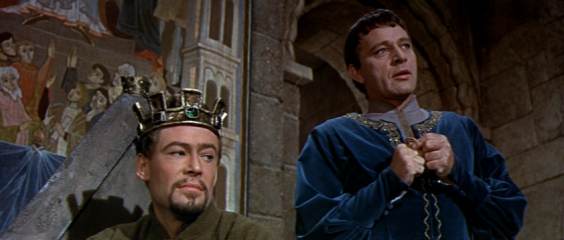
But it is an even earlier Henry who features in Becket, only the
second King of England to carry the name. Although the credits award
first billing to Richard Burton in the title role of Becket, the film is
as much about Henry as it is about Thomas à Becket. Becket is
straightforward and uncomplicated — at first a worldly and scheming
advisor to the King, he later becomes resolute in his godliness after
becoming Archbishop of Canterbury.
[...]
Submitted by taoyue on Wed, 05/25/2005 - 16:00
Easter Parade (1948)
directed by Charles Walters
songs by Irving Berlin
starring Judy Garland and Fred Astaire
Frames in this review are taken from the Warner Brothers DVD.
Easter Parade was finally released on DVD in time for Easter 2005. Of
course they did it for the marketing tie-in, but the film’s Easter theme
is merely incidental. It’s one of those happy musicals churned out by
the MGM Dream Factory, and it’s appropriate year-round. Particularly
notable is the fact that this was the only musical in which Judy Garland
starred alongside Fred Astaire. (Notice who goes first in the billing.
Fred may have been the better dancer by far, but Judy was the bigger box
office draw.)
[...]
Submitted by taoyue on Mon, 04/11/2005 - 16:00
La Double Vie de Véronique (1991)
aka The Double Life of Veronique
directed by Krzysztof Kieslowski
Frames in this review are taken from the Criterion Collection DVD.
France has long served as a haven for Polish expatriates. In music
there’s Frédéric Chopin, in chemistry there’s Marie Curie, and in film
there’s Krzysztof Kieslowski. Indeed, Kieslowski would pay tribute to
two centuries of Franco-Polish friendship in his
Three Colors trilogy :
Blue
:
Blue ,
White
,
White , and
Red
, and
Red , from the three colors of the French flag. Despite
the grand conception of the trilogy, the individual films remain
intimate, each focusing on the personal connection made between two
individuals.
, from the three colors of the French flag. Despite
the grand conception of the trilogy, the individual films remain
intimate, each focusing on the personal connection made between two
individuals.
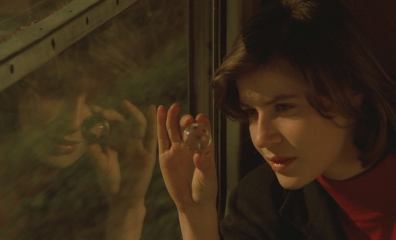
The Double Life of Veronique goes farther. The two people here
are connected in a far deeper way, for they are two instances of the same
young woman: Weronika in Poland, and Véronique in
France. Both are played by French actress Irène Jacob. (Duality is a
common theme in Kieslowski films: the posthumously-produced
Heaven would follow two unrelated people who are spiritual
twins, one male and one female.)
would follow two unrelated people who are spiritual
twins, one male and one female.)
[...]
Submitted by taoyue on Mon, 04/11/2005 - 16:00
Those Magnificent Men in Their Flying Machines
or: How I Flew from London to Paris in 25 hours 11 minutes
(1965)
directed by Ken Annakin
Frames in this review are taken from the Fox DVD, which shows once again
that price is entirely unrelated to technical quality.
Those Magnificent Men in their Flying Machines is surprisingly
funny for a comedy from 1965 filmed in 70mm. [...]
The wry verbal humor works better. The two most important capitals of
the world are, of course, London and Paris. Tossing a dozen letters into
international mail bins: "You know, between these invitations and the
newspapers, we should reach every flying man in the world." And the
pervasive joke about the limited capabilities of the planes — Flying
across the English channel? How daring, it's twenty-two miles of open
water! There's also the girl that Dubois keeps seeing, but she's always
a different nationality each time and named after a famous actress:
Brigitte, Ingrid, Marlene, Françoise, Yvette, or Betty.
[...]
Submitted by taoyue on Tue, 04/05/2005 - 16:00
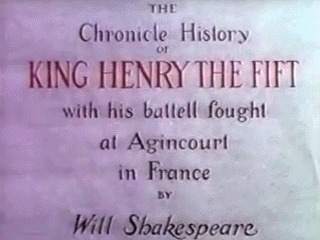

Henry V (1944)
directed by Laurence Olivier
Frames in this review are taken from the Criterion DVD.
Laurence Olivier's Henry Vis a vivid dramatization of
Shakespeare and a great cinematic achievement. The young English King
crosses the Channel, defeats the enemy, and returns to England with a
French bride. Although France begins the play as the enemy, it ends up
being joined to England by the bonds of matrimony. The film concludes
with a shot their rings, Queen Katharine’s bearing the fleurs lis, and
King Henry's both Plantagenet lions and fleurs de lis.
If this seem too simplistic a description of the relationship between
Britain and France, then that's simply a consequence of its function as
wartime propaganda. The film was shot and released during the Second
World War, as another great English-speaking host prepared to invade
France. The Soviet equivalent would be Eisenstein's
Ivan the Terrible , in which a ruthless Russian prince consolidates
Russia, fights a great patriotic war against the Mongols, and sends
envoys to Queen Elizabeth of England. Except that film presented Ivan’s
brutality in such a way that Stalin would be none-too-pleased.
, in which a ruthless Russian prince consolidates
Russia, fights a great patriotic war against the Mongols, and sends
envoys to Queen Elizabeth of England. Except that film presented Ivan’s
brutality in such a way that Stalin would be none-too-pleased.
In contrast, King George would surely approve of Olivier's Henry, a
paragon of virtue and moral clarity. Shakespeare's Henry had excesses in
his youth, but leaves them behind when he coldly scorns [...]
Submitted by taoyue on Mon, 04/04/2005 - 16:00
Air Power
The Men, Machines, and Ideas that Revolutionized War, From Kitty Hawk to Iraq
by Stephen Budiansky
Hardcover: New York: Viking, 2004. ISBN 0-670-03285-9
Paperback: New York: Penguin, 2005. ISBN 014303474X
This is a long book at 518 pages including notes and index, and it has a subtitle that's almost as long: "The Men, Machines, and Ideas that Revolutionized War, From Kitty Hawk to Gulf War II." It is significant that the beginning and the end both refer to American developments. Not only did two American brothers develop the first heavier-than-air craft, but American forces have enjoyed air superiority in every war since the First World War. Budiansky presents most of the debates on air doctrine in an American or British context, and undoubtedly it helps that these records would be available in English. But he clearly believes that they set the pace of world developments. The role of other world powers was to react — for example, there is very little discussion of the Soviet air force.
The book focuses on the great debate between strategic and tactical air power. Should airplanes be used to bring war to the enemy's homeland, or should they be used to win quickly and decisively on the battlefield? It would simply overwhelm the reader if Budiansky had covered a century of flight from every nation's viewpoint. But when important developments occur overseas, the book travels there — to Spain as the Luftwaffe tests out its doctrines in preparation for World War II, to the Japanese carrier fleet in the run-up to Pearl Harbor, and to Israel as American air power wins overwhelming victories against Soviet technologies through the Arab-Israeli proxy wars.
[...]
Submitted by taoyue on Mon, 04/04/2005 - 00:00
Grand Prix (1966)
directed by John Frankenheimer
Frames in this review are taken from the two-disc Warner Brothers DVD,
released in July 2006.
Grand Prix is the showpiece film for Formula One racing and a
cult favorite in the racing community. It shows historical racetracks
from Formula One’s early days that no longer exist, and pioneered the
in-car race footage that is now a staple of television footage. Yet
despite its niche position in the market, the film is actually quite
accessible even to someone whose only contact with racing comes from
channel-surfing.
In a way, Grand Prix is the best Arthur Hailey film ever made,
even though it's not based on an Arthur Hailey novel. It brings in a
Grand Hotel -esque cast of characters, spins them around in a
blender, and spits them all out into a spectacular climax. And, unlike
that stillborn Arthur Hailey 70mm spectacle
Airport
-esque cast of characters, spins them around in a
blender, and spits them all out into a spectacular climax. And, unlike
that stillborn Arthur Hailey 70mm spectacle
Airport , Grand Prix requires no artificial action
beyond what happens in the normal course of a race. The expert camera
work and careful editing give the live-action racing sequences a thrill
that is impossible to achieve with special effects.
, Grand Prix requires no artificial action
beyond what happens in the normal course of a race. The expert camera
work and careful editing give the live-action racing sequences a thrill
that is impossible to achieve with special effects.
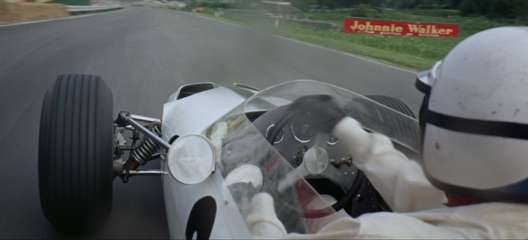
Formula One racing
The reason to watch this film is for the racing. The surrounding plot is
close to soap opera and is not that interesting. Fortunately, the racing
scenes are spectacular and absorbing, shot from inside the cockpit, in
the air, along the track, in a chase car, pretty much everywhere that a
camera can go. The fact that most of it was shot in real life with the
cars traveling at high speeds gives it a very authentic look, and some of
it comes from actual Formula One races. The excitement is enhanced by
the editing, with frenetic cutting juxtaposed with longer sequences that
provide the viewer with situational awareness of the larger race.
[...]
Pages